Duane Morris Takeaway: This week’s episode of the Class Action Weekly Wire features Duane Morris partners Jerry Maatman and Jennifer Riley with their analysis of class action settlements over the past 24 months and key factors influencing the era of billion-dollar class actions.
Check out today’s episode and subscribe to our show from your preferred podcast platform: Spotify, Amazon Music, Apple Podcasts, Samsung Podcasts, Podcast Index, Tune In, Listen Notes, iHeartRadio, Deezer, and YouTube
Episode Transcript
Jerry Maatman: Welcome loyal blog readers to our weekly installment of our podcast series, entitled The Class Action Weekly Wire. I’m Jerry Maatman, a partner at Duane Morris, and joining me today is vice chair of our class action defense group, Jennifer Riley, of our Chicago and New York offices. Welcome, Jen.
Jennifer Riley: Great to be here, and thanks for having me.
Jerry: Today we’re discussing one of the biggest trends in the class action litigation space – involving settlement numbers and settlement amounts in class action litigation. Over the last two years, we’ve seen the highest numbers ever in the history of American jurisprudence. It’s certainly true that settlement numbers have been through the roof, and so we’re going to take a look at not only the last two years, but also the first six months of 2024. It’s clear to us that we’ve certainly entered a new era of heightened risks and higher stakes in class action litigation – Jen, what’s your take on the trends in this particular area?
Jennifer: Thanks, Jerry, I agree completely. The numbers are just staggering. In 2023, parties agreed to resolve 10 class actions for a billion dollars or more. In 2022, parties resolve 14 class actions for a billion dollars or more in settlements. That makes 24 billion-dollar settlements in two years. Many of the settlements in 2023 emanated outside of the products and pharmaceutical space, really signaling a wider base and a greater threat to businesses as these settlements continue to redistribute wealth. However, these settlements have reached virtually all industries and all areas of the country.
Jerry: Let’s talk about one in particular, and that’s the $12.5 billion-with-a-B class action settlement in 2023 stemming from the federal court in South Carolina, In Re Aqueous Film-Forming Foams Products Liability Litigation. It’s somewhat of a mass tort situation as well as product liability – involving chemicals used in film forming work and fire extinguishing agents – claiming that it causes cancer, and PFAS forever chemicals are linked to both health risks and environmental contamination. The plaintiffs claim that exposure to these chemicals resulted in cancer, liver damage, and other health conditions, and that the manufacturers of these chemicals knew or should have been aware. was no trial on the merits. Parties agreed to settle, but at $12.5 billion – the largest class action settlement of the year. What other areas and what other cases spike those big numbers over the past year?
Jennifer: The third largest settlement of 2023 was in an antitrust class action that was called In Re Payment Card Interchange Fee and Merchant Discount Antitrust Litigation. The settlement of $5.6 billion resolved claims by the plaintiffs who were primarily merchants, merchant associations who were alleging that credit card companies and their networks engaged in anticompetitive practices. The core claim there was that the networks, Visa and MasterCard, conspired to fix interchange fees and to prevent competition, thereby inflating the costs for merchants. In particular, the plaintiffs alleged that Visa and MasterCard engaged in practices that restricted merchants from negotiating better terms or accepting competing payment methods. The plaintiffs claimed that those practices harm competition by reducing the incentive for credit card networks to lower their fees or to improve their services. And they argued that this in turn led to higher costs for merchants, which were ultimately passed on to consumers.
Jerry: So, as our readers know, we examine class action settlements every day; we track all the rulings, filings in every state court, in every federal court throughout the United States. And so we’ve done an analysis of settlements from January 1 through June 30, and we wanted to kind of preview what that looked like – Jen, what do you think the numbers are showing, or the trend is showing, in comparing the first half of 2024 to what happened over the past two previous years?
Jennifer: Great question, Jerry. So, 2024 is looking to be another blockbuster settlement year. It might not be quite as robust as the past two years. But there are several settlements that already have been approved by the courts that hit that one billion-dollar benchmark. For example, in the consumer fraud space, a $1.5 billion settlement was announced in a case called Fitzgerald, et al. v. Wildcat, which is a class action alleging that around 2012 or 2013, a federally recognized Native American tribe a began partnering with a non-tribal payday lender, who entered into agreements that allowed them to oversee and collect on loans issued by lenders owned by the tribe. In that case, the tribe alleged that the lenders collected millions of dollars in unlawful debts, and conspired with each other and others to repeatedly violate state lending laws resulting in the collection of unlawful debts from the plaintiffs and from the class members.
Jerry: That’s a really interesting settlement, certainly an incredibly interesting class action. Another one that is beginning to get play in the press involves a government enforcement action – looks like a class action, basically functions like one – involving the State of Texas suing Meta Platforms for privacy violations. And it looks like a settlement coming in at $1.4 billion. So, given the size of some of these settlements, I agree that 2024 is shaping up to be even higher than the previous two years. So it’s very clear that we’re in a new era, a new zone in terms of the price of settlements, the expectations of plaintiffs, and the way the plaintiffs’ bar is pushing the numbers in terms of their theory – to file, certify, and then monetize these class actions.
Well, thanks so much, Jen, for your time and your expertise, and thank you to our loyal blog readers for listening in to this installment of our Class Action Weekly Wire.
Jennifer: Thanks, and thanks everyone for joining us.












